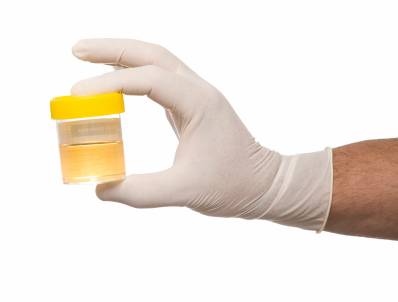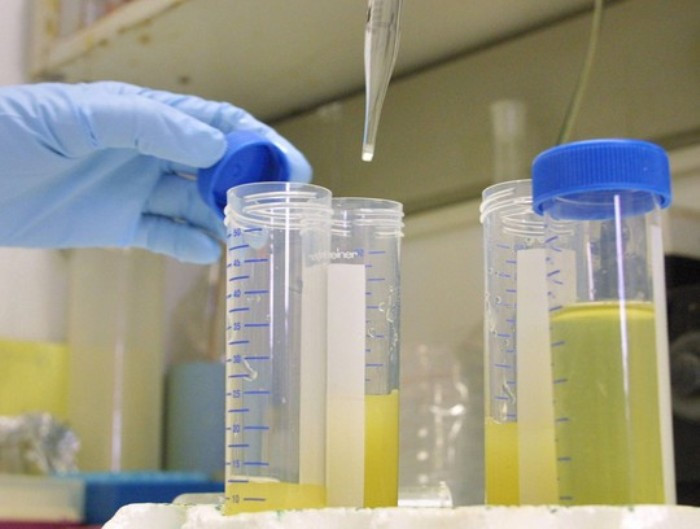Diagnosis of the disease through urine
Urine is a great predictor of your health. Through the color and smell of urine we can predict health status, even alert some hidden disease in your body.
According to Dr. Michael Farber, executive director of the Health Program at Hackensack University Medical Center in Hackensack, New Jersey (USA), the color and smell of urine as well as the frequency of urination can reveal what is happening in your body.

The urine is pale
If your urine is as transparent as normal water, it's okay, that's because you probably drink a lot of water in one use. Besides, urinating too many times a day will be an inconvenience that interferes with all other activities, because your bladder contains too much water, but nothing to worry about.
The urine is too dark in color
If your urine is dark as the color of ice tea for a long time , it is a sign that your body is dehydrated and your kidneys produce more concentrated urine (as opposed to diluted urine). . According to Dr. Michael Farber: 'Urine discloses details of signs of dehydration in the body, so if the patient complains about dizziness, dizziness, it is advisable to check the health status of the water. Urination to overcome dehydration of the body '. Another reason you have to check urine if its color is too dark, especially after you drink a few glasses of water and still not relieve it, means that your blood has had problems. It may be a sign of hemorrhage in the kidneys , from which people can fall into one of the cases such as infection, kidney disease or even cancer.

Smell urine has a sweet taste
After you urinate, if you smell something sweet and sweet, it may be a sign of something very serious going on inside your body. Dr Michael Farber said: ' Sweet smells can signal blood sugar levels in the urine '. And the high concentration of blood sugar can be one of the signs of diabetes . The kidney acts as a machine that filters all waste circulating in the body. But if your ' filter ' is damaged, there will be many things from the filter that will leak out and end through urination. In the case of diabetes, excessive sugar in the blood will secrete outside and appear in the urine. If you are pregnant, changes in the kidney dialysis system can cause urine sugar. Whether you are pregnant or not, if your doctor finds sugar in your urine, you should have a closer examination because diabetes is really worrying.

Urine has a strange smell
There may be a little concern but smelling a strange odor while you urinate is something that shouldn't be taken care of much. Certainly, asparagus foods, for example, produce amino acids that contain sulfur. Because when food is crushed into the digestive system, things with different smells will be released, absorbed through the kidneys, then from there urine will form an unpleasant odor. Soon after the food is completely digested, the strange smell when you urinate also disappears.
Urine is bright yellow
The urine that looks yellow like neon lights also seems unusual but the cause of this phenomenon is not dangerous compared to the vitamin pill you are taking every day. According to Dr. Deborah J. Lightner, associate professor of urology at the Mayo Clinic in Rochester, Minnesota (USA), vitamin B and carotene in urine will make urine appear bright yellow. And do not worry: This color does not cause much anxiety, it is simply a secretion of excess substances in your body. The color of urine comes from vitamins filtered through your system or even during absorption and use.
 If the number of urination increases abnormally, you should consult your doctor
If the number of urination increases abnormally, you should consult your doctor
There are blood stains in the urine
If urinating and seeing blood veins in the restroom, there are two cases that some people think are normal but there are quite a few people who sleep and sleep because of it. Dr. Deborah J. Lightner warns: ' For this reason you should ask your doctor to test your urine if you see blood. For young, healthy women, urine bleeding may be a symptom of infection in the urinary tract, but if there is blood in the urine, it is also one of seven signs of danger of cancer. bladder letter in both men and women '. In addition to the possibility of infection or the worst case of cancer, blood in the urine is also caused by minor injuries or tears, kidney stones, or the side effects of thinning medications. blood or treatment with aspirin daily.
Urinate several times a day
You have seen promotional videos of people going to the toilet very fast and with an unprecedented urgency. Actually there are many causes of this symptom, sometimes it also disrupts the rhythm of life. The first reason is that you must check your diet and lifestyle . If you drink water all the time and whenever you are thirsty, then you drink it, you're stretching your H 2 O intake into your body, which will make your bladder swell, making urination tend to be more permanent. Or once you naturally change your diet with a range of foods that contain plenty of water (such as fruits and vegetables) to stimulate the ability of diuretics or start taking medications (like antihypertensive drugs) ) also has a diuretic effect.
One of the symptoms of urinary tract infections is the feeling of always wanting to urinate. Older people are more likely to urinate and fall into both men and women simultaneously, so the kidneys also work at their full capacity. However for men, the prostate plays an important role. As men age, the prostate gland begins to expand and hinder the flow of urine and prevent bladder operation, thus making people more likely to urinate frequently instead of just ' discharge ' once.

Urination
Urination is one of the subtle topics that are rarely mentioned, but many women, including young women who have not experienced childbirth, also become urinary incontinence. Dr. Deborah J. Lightner said: Uncontrolled depression is a condition that leads to the pelvic floor muscles unable to handle the increased pressure of high-frequency activities such as jogging or do gymnastics, or even something similar to coughing or sneezing. And when the pelvic floor is too weak to stand up to the pressure, the result is a small amount of urine will automatically leak out without any rules. This situation often takes place after the time when the woman gives birth. There is another type of urinary incontinence called ' Unconfident ', not due to weak muscles but due to bladder problems. According to Dr. Deborah J. Lightner, it is because your bladder feels stimulated to urinate despite the fact that you have no need to go to the toilet.
Feeling restless and hot
If you suddenly have a burning sensation when urinating, it is one of the first signs that you have an infection in the urinary tract . Urinary tract infections are often very common in sexual acts, pre-menopausal women. Taking antibiotics can clean the infection within a few days and boosting fluids can help get rid of infections that shorten the time of infection. Through urological surgery, men have less urinary tract infections than women but in fact, this symptom still occurs and warns a urinary tract infection, Dr. Deborah J. Lightner said. Causes of prostate infection in men.

Urine is bubbling
When you encounter this sign, you have a higher risk of kidney disease . When the kidney is not working properly, it can lead to accumulation of protein in the urine. This protein will produce air bubbles when it comes in contact with water in the toilet. You are at risk for kidney disease if you have a history of high blood pressure, diabetes or a family member who has had it.
Urinate with gas to escape
Bladder bacteria can produce gas when you urinate. If there are any signs of urinary tract infection, see your doctor. Very few possibilities, but you may also have an abnormal fistula in the bladder or between the bladder and the colon. You are also at risk of developing a fistula if you have a history of chronic inflammatory bowel disease or ulcerative colitis.

- How to guess disease from urine color
- Opaque urine: Causes, diagnosis and treatment
- See your urine to see if you are fine or weak
- Warning about health status from urine
- Smart paper guessing disease
- Yellow urine warns what you already know?
- New invention helps diagnose Alzheimer's early
- Urine is good for the health drink?
- New discoveries about use
- 13 surprisingly interesting things about urine
- Using urine to create electricity, by the way, clean up all germs in the urine
- Diagnosing bladder cancer with urine odor
 Green tea cleans teeth better than mouthwash?
Green tea cleans teeth better than mouthwash? Death kiss: This is why you should not let anyone kiss your baby's lips
Death kiss: This is why you should not let anyone kiss your baby's lips What is salmonellosis?
What is salmonellosis? Caution should be exercised when using aloe vera through eating and drinking
Caution should be exercised when using aloe vera through eating and drinking